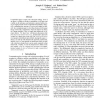Free Online Productivity Tools
i2Speak
i2Symbol
i2OCR
iTex2Img
iWeb2Print
iWeb2Shot
i2Type
iPdf2Split
iPdf2Merge
i2Bopomofo
i2Arabic
i2Style
i2Image
i2PDF
iLatex2Rtf
Sci2ools
CORR
2011
Springer
2011
Springer
I Don't Want to Think About it Now:Decision Theory With Costly Computation
Computation plays a major role in decision making. Even if an agent is willing to ascribe a probability to all states and a utility to all outcomes, and maximize expected utility, doing so might present serious computational problems. Moreover, computing the outcome of a given act might be difficult. In a companion paper we develop a framework for game theory with costly computation, where the objects of choice are Turing machines. Here we apply that framework to decision theory. We show how well-known phenomena like first-impression-matters biases (i.e., people tend to put more weight on evidence they hear early on), belief polarization (two people with different prior beliefs, hearing the same evidence, can end up with diametrically opposed conclusions), and the status quo bias (people are much more likely to stick with what they already have) can be easily captured in that framework. Finally, we use the framework to define some new notions: value of computational information (a ...
| Added | 19 Aug 2011 |
| Updated | 19 Aug 2011 |
| Type | Journal |
| Year | 2011 |
| Where | CORR |
| Authors | Joseph Y. Halpern, Rafael Pass |
Comments (0)

